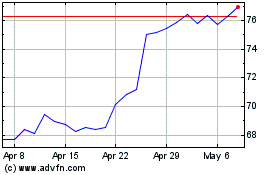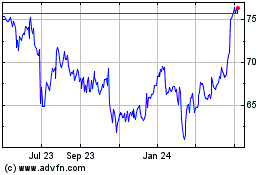By Jared S. Hopkins and Sabrina Siddiqui
Countries such as Pakistan, Afghanistan, Bangladesh and Sri
Lanka have petitioned the U.S. for Covid-19 vaccines as the Biden
administration prepares to share 80 million doses, which foreign
governments say they need to slow the spread of the
coronavirus.
Dozens of countries have sought a chunk of the doses the U.S.
plans to donate overseas by the end of June, a senior
administration official said.
"What the U.S. has is a gold mine," Ravinatha Aryasinha, Sri
Lanka's ambassador to the U.S., said in an interview.
The administration said it planned to share 60 million doses of
the AstraZeneca PLC vaccine, following a safety review by the Food
and Drug Administration, and 20 million doses from the vaccines
from Moderna Inc., Pfizer Inc. and Johnson & Johnson, whose
shots are being given to people in the U.S.
The Biden administration has faced growing pressure to share
vaccine doses with developing countries amid outbreaks in India and
Brazil. Mr. Biden said the U.S. would be a world leader in global
vaccination efforts and characterized the 80 million doses as a
first step.
Those doses represent a fraction of those needed to vaccinate
much of the world's eight billion population. Countries are
desperate for any doses because of outbreaks and emerging variants,
and there is limited supply as manufacturers increase production
and expand capacity.
The Biden administration has said U.S. doses will be shared both
directly with other countries and through Covax, a global
initiative to deliver vaccines to developing countries. White House
press secretary Jen Psaki told reporters last week that an
announcement would be made soon on where doses would be
distributed.
A White House official said the National Security Council,
Department of Health and Human Services, State Department and the
U.S. Agency for International Development have been involved in
determining where to send the doses. The administration has also
been consulting people involved with Covax, vaccine manufacturers
and others on considerations that include shipping doses out of the
country, transporting them to different places and legal
requirements, the person said.
Some vaccines require special cold-chain logistics, which could
be difficult in some low-income countries.
The U.S. has fully vaccinated more than 50% of its adult
population. But the administration has waited to share doses in
part because it is trying to reach hesitant Americans and has begun
vaccinating adolescents.
Last month, the administration said it supported a proposal from
India, South Africa and other countries to share intellectual
property of Covid-19 vaccines to help spur production. The drug
industry and trade experts have said that such a move wouldn't
increase doses in the short term.
The world's poorest 50 countries account for just 2% of the
Covid-19 vaccines administered globally so far, according to the
International Federation of Red Cross and Red Crescent
Societies.
Bangladesh Foreign Minister A.K. Abdul Momen asked the U.S. in a
May 7 letter to Secretary of State Antony Blinken for at least two
million AstraZeneca doses immediately and another 10 million to 20
million later on.
Bangladesh made the request because it needs to administer
second doses to about 1.6 million people and is willing to buy the
doses if they can't be donated, Mr. Momen said in an interview. He
said he has made the request in meetings with U.S. officials here
and in Bangladesh.
"We are in desperate need for this two million," he said. "This
has become a crisis."
He said U.S. officials have said they are weighing the
request.
Bangladesh, with about 165 million people, has received seven
million of the 30 million AstraZeneca doses it agreed to purchase
from the Serum Institute of India, according to the letter. The
letter also said India separately donated about 3.2 million doses
to the country. Bangladesh also has agreements for China's
Sinopharm vaccine and Russia's Sputnik V, according to Duke
University's Global Health Innovation Center, which tracks vaccine
purchases.
In a letter to Mr. Biden on Sunday, Vietnamese President Nguyen
Xuan Phuc asked for access to the 80 million doses and requested a
phone call to discuss how their governments can cooperate on
vaccine research and production.
Mr. Phuc wrote that although Vietnam has received doses through
Covax, the country's vaccination rate is low because global vaccine
resources are hard to access.
After Mr. Biden announced plans to export AstraZeneca doses, Sri
Lanka asked the U.S. to provide 600,000 doses so the country could
give second shots to people in the country, Mr. Aryasinha said. He
said the country has a shortfall because it stopped receiving doses
from the Serum Institute of India after India banned exports.
More than 7% of the country's more than 21 million people have
received at least one dose, according to Our World in Data, a
project based at Oxford University. The country has procured 28
million doses of various types, according to Unicef.
The country on May 18 asked for any Johnson & Johnson doses
the U.S. can spare, Mr. Aryasinha said. He said the U.S. said
officials are considering the requests, but the AstraZeneca doses
couldn't be provided at least until the FDA signs off on sharing
the vaccine.
"If that gets cleared, our prayers would be answered," Mr.
Aryasinha said. Sri Lanka made its requests in letters to the
administration and in meetings with U.S. officials.
Afghanistan asked the U.S. to provide doses directly to the
country and through multilateral efforts such as Covax, according
to a spokeswoman for the country's embassy. Covax has allocated
more than 2.5 million vaccine doses for Afghanistan and has given
468,000 doses of the AstraZeneca vaccine, the spokeswoman said.
China has committed to providing 400,000 doses of Sinopharm's
vaccine, and India provided 500,000 doses of AstraZeneca PLC's
vaccine, she said.
Earlier this year, the U.S. said it would send a total of four
million AstraZeneca doses, which officials described as a loan, to
Mexico and Canada. Mr. Biden also announced an initial $2 billion
investment in Covax in February and plans to release another $2
billion when other countries meet their commitments.
Write to Jared S. Hopkins at jared.hopkins@wsj.com and Sabrina
Siddiqui at Sabrina.Siddiqui@wsj.com
(END) Dow Jones Newswires
June 01, 2021 15:05 ET (19:05 GMT)
Copyright (c) 2021 Dow Jones & Company, Inc.
AstraZeneca (NASDAQ:AZN)
Historical Stock Chart
From Mar 2024 to Apr 2024

AstraZeneca (NASDAQ:AZN)
Historical Stock Chart
From Apr 2023 to Apr 2024
